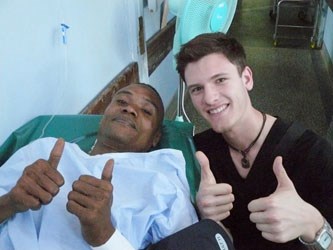First-year medical student Jared Oberkirsch recently returned from a surgical mission in Africa where he learned to take nothing for granted.
Oberkirsch left Weyburn for Malindi, Kenya on June 1 and arrived five days later after spending nearly 23 hours in the air on five different planes. He went with his great-uncle, retired dentist and former Weyburn-area resident John Bailey, who organizes the medical mission annually. The team of 36 surgeons, nurses, medical students and translators spent two weeks in Malindi, performing 177 free surgeries for impoverished Africans.
Oberkirsch spent his time assisting the anaesthesiologist during the mission and performing pre and post-operation duties. The team spent their time between two hospitals - Tawfiq Hospital and Malindi District Hospital.
Oberkirsch explained that Tawfiq was a private, Muslim-run hospital while the district hospital was government-run.
"There was a big difference between the hospitals," said Oberkirsch. "Tawfiq was clean and modern. Malindi Hospital was crowded and dirty but the nurses did the best they could."
Oberkirsch said the district hospital had three wards with 64 beds each and only two nurses per ward. He said it was not uncommon to see at least three children in one bed due to overcrowding.
"Quite often, family members would come to help care for a patient because the nurses were so busy."
Oberkirsch spent most of his time at the district hospital where conditions were not quite what he had gotten used to while shadowing doctors in Canadian hospitals.
"We brought almost all of our own equipment," said Oberkirsch. "There were no light bulbs in the operating room, we had to bring them."
Oberkirsch explained that the power went out continuously during the day and surgeons often needed the med students to hold flashlights for them during surgery. He said that he and the younger members of the group even used their iPhone flashlight app to light up the operating table.
They constantly had to pump the hydraulics on the surgical table as well in order to keep it propped up. They even propped it up with stools.
"Things did not run as smoothly as they do here but there was no reason to complain because there was nothing you could do about it," said Oberkirsch.
The three basic surgeries the team performed were hernia repairs, hysterectomies, and hydrocele removals.
Despite having no air conditioning or refrigeration at the hospital, Oberkirsch said there were a few perks after a long day of surgeries.
"A warm pop after a surgery was quite a treat for us!"
The team performed surgery on residents who were unable to afford health care and quite often, the conditions had gotten quite bad before care was able to be administered.
"Everyday people lined up outside the recovery room to see if they could get surgery. By the time we got to the middle of our trip, our schedule was booked."
Oberkirsch said that some people needing surgery were booked for next year's mission.
"It seemed like a pretty dim situation, but the patients were so gracious regardless."
"It really spoke to how nice we have it here. In North America, we feel entitled to a private room and immediate care."
Oberkirsch said that being out of his comfort zone and helping others was a very rewarding experience, although he felt a bit culture shocked upon his arrival in Africa, and again on his return home.
"When I left to go to Africa there was no flooding, when I came back people were dealing with flooding and boiling water."
"What we don?t realize is, sure we had to boil our drinking water but we don't have to walk to a well to get it. We have multiple pots to boil in - not just one. We have a stove - we don't have to rely on fire. We have a fridge to keep water cool. We also have electricity to boil kettles and the financial means to buy water bottles, whereas in Africa they don't have these things."
Oberkirsch said the experience left him feeling "richly blessed" and inspired to not take his everyday life for granted.
The team was able to get away from the hospital to see a few sites. They went on a weekend safari to Tsavo East National Park where they saw several unique African species. They also visited a Massai village.
Oberkirsch plans to return to the University of Saskatchewan at the end of August to attend his second-year of medical school. He said that he is interested in pursuing a career as a general practitioner and plans to practice close to home.
Oberkirsch is the son of Garth and Cheryl of Weyburn.




